Journey to Brilliance
At Tiny Minies, we're dedicated to nurturing every child's potential through formative years: fostering language acquisition, motor skills, creativity, and problem-solving abilities to empower them to thrive.
Nurturing Developmental Milestones for Growing Minds
Guiding little explorers through magical milestones, sparking curiosity and joyful learning at every turn!
Language
FOR 2
Celebrate language exploration with our 2-Year-Old stars: Engaging activities that spark the joy of words and foster early communication skills!

Starting to recognize and name familiar objects, animals, and people in their surroundings.
Often showing excitement when learning new words and using them spontaneously in sentences.
Enjoying to imitate various sounds and animal noises, adding to their playful communication repertoire.
Beginning to form two-word combinations.
Combining nouns and verbs to express basic ideas, such as 'more juice,' 'big ball,' or 'mommy play.'
While their phrases may lack articles and prepositions, they convey meaning effectively.
Understanding and following simple, one-step instructions.
Responding to requests like 'come here,' 'give me the toy,' or 'wave bye-bye.'
Engaging in simple conversations and responding to questions with gestures or single-word answers.
Starting to express their emotions and needs through language.
Saying simple phrases like 'I'm tired,' 'I want juice,' or 'I love you.'
Pointing to express their interests and share discoveries, as well as naming objects and people they encounter.
Vocabulary and Word Play
Early Language Combinations
Comprehension and Communication
Emotion Expression and Connection
Cognitive Development
FOR 2
Unleashing Wonders - At 2 years old, our little curious explorers are on a sensory journey, discovering shapes, colors, and textures.

Engaging in hands-on play to explore shapes, colors, and textures, stimulating their senses.
Building language and memory skills, using words to express needs and recalling familiar objects.
Embarking on imaginative pretend adventures, fostering creativity and cognitive development.
Using words to express needs and simple thoughts, building early sentence structures.
Recalling names of common objects and family members, showing improved memory.
Enjoying rhymes and repetitive stories, enhancing language and memory abilities.
Experimenting with toys and objects, observing how they respond to their actions.
Engaging in simple problem-solving activities, exploring relationships between actions and results.
Demonstrating curiosity and eagerness to understand the world through cause and effect interactions.
Using everyday objects symbolically, such as pretending a box is a car or a doll is a baby.
Engaging in make-believe scenarios, demonstrating emerging creativity and imagination.
Developing social skills through role-playing, learning to interact with others in pretend situations.
Sensorimotor Exploration and Object Permanence
Growing Language and Memory Skills
Discovering Cause and Effect
Imaginative Play and Pretend Adventures
Social Emotional Learning
FOR 2
Dynamic Bonds of Trust and Exploration - At 2 years old, our stars form trusting bonds, express emotions, and explore shared play.

Developing attachment and bonding with primary caregivers.
Demonstrating comfort when caregivers are present and responsive.
Showing signs of distress when separated from familiar caregivers.
Expressing a wide range of emotions, including joy, frustration, and fear.
Developing basic self-awareness, recognizing themselves in mirrors or photos.
Displaying increasing independence and asserting their preferences.
Showing basic empathy towards peers and caregivers, offering comfort when others are upset.
Demonstrating curiosity about others' emotions and facial expressions.
Recognizing familiar emotions in others, such as happiness or sadness.
Engaging in parallel play alongside peers, though not yet actively playing together.
Enjoying shared experiences with other children, such as group activities or storytime.
Demonstrating early attempts at cooperative play, such as imitating others or sharing toys briefly.
Building Trusting Relationships
Expressing Emotions and Developing Self-Awareness
Beginning Empathy and Understanding Others' Emotions
Exploring Parallel Play and Shared Experiences
Gross Motor & Fine Motor
FOR 2
Unleashing Curiosity - At 2 years old, little explorers are confidently walking, climbing, scribbling, and building blocks with newfound curiosity.

Developing pincer grasp to pick up small objects between thumb and finger.
Scribbling and making marks with crayons and other writing tools.
Building towers with blocks and knocking them down, refining hand-eye coordination.
Walking independently and exploring the environment with enthusiasm.
Climbing stairs with support and navigating playground equipment.
Holding and using a spoon or fork to self-feed, developing self-help skills.
Engaging in simple puzzles, matching shapes, and fitting objects together.
Stringing large beads onto a string, refining hand-eye coordination.
Turning pages of a book one at a time, showing improved fine motor control.
Running, jumping, and hopping with increasing control and balance.
Kicking a ball forward and catching a large ball with both hands.
Participating in basic dance movements and enjoying music-related activities.
Grasping and Exploring the World
Beginning Independence in Movement
Developing Hand-Eye Coordination
Exploring Whole Body Movements
Self Care
FOR 2
Embracing Independence - At 2 years old, our little dynamic explorers venture into self-feeding, attempt dressing, and make simple choices with growing independence.

Attempting to feed themselves with a spoon or finger foods, showing self-feeding interest.
Participating in basic dressing skills, such as trying to put on shoes or socks.
Expressing preferences and making simple choices, displaying a sense of autonomy.
Demonstrating awareness of bodily functions and showing interest in using the potty.
Indicating the need for diaper changes or potty time, expressing basic cues.
Beginning to associate the bathroom with toileting routines.
Attempting to wash hands with assistance, developing hand hygiene habits.
Beginning to brush teeth with assistance, showing interest in oral care routines.
Taking part in cleaning up toys and simple tasks, demonstrating responsibility.
Using gestures and words to express basic needs and preferences.
Communicating emotions, such as happiness, frustration, or excitement.
Engaging in parallel play and simple interactions with peers, building social skills.








